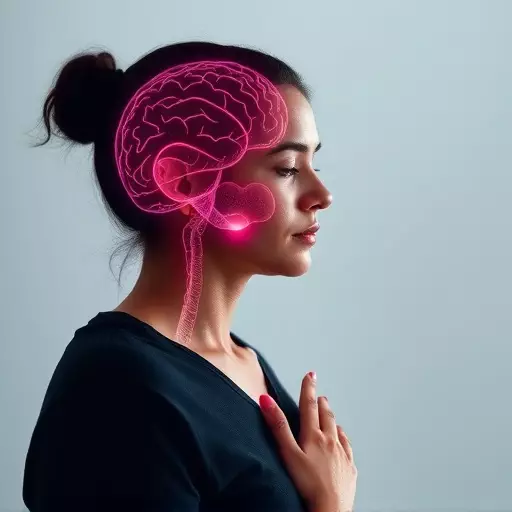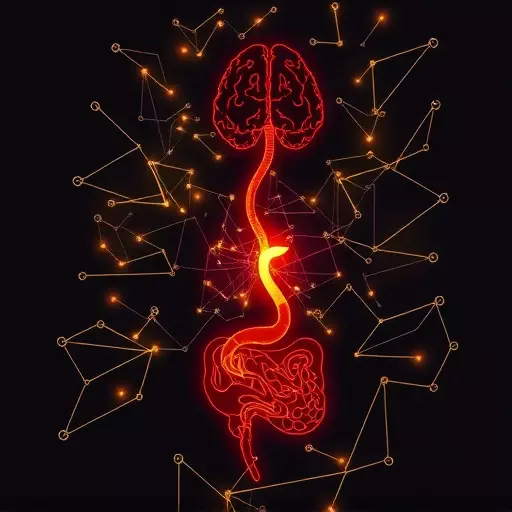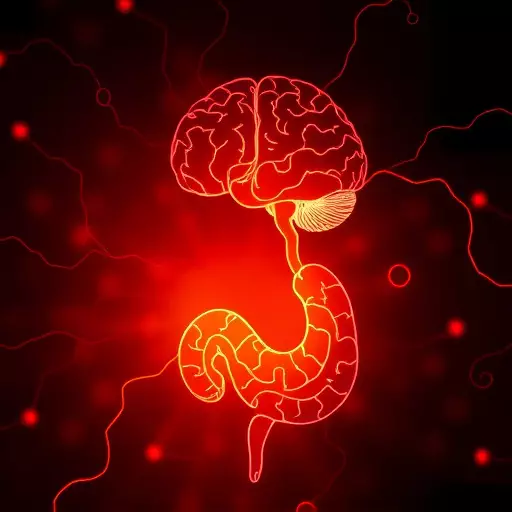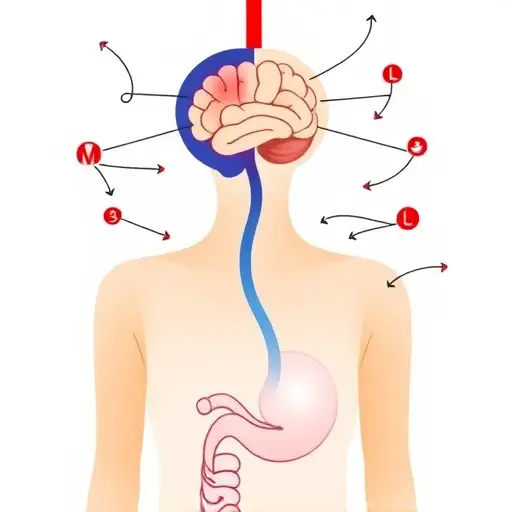Trauma-related insomnia is a complex sleep disorder affecting individuals who have experienced traumatic events. Integrative medicine in Toledo offers holistic approaches using somatic therapies for PTSD treatment and gut-brain axis interventions to manage anxiety. These strategies aim to improve sleep quality by helping individuals process traumatic memories and emotions while calming physiological reactions. Somatic therapies like yoga, massage, and mindfulness practices directly impact the nervous system, while gut-brain axis interventions focus on dietary modifications and probiotics to support emotional well-being. Integrative medicine in Toledo effectively treats trauma-related insomnia and associated conditions like PTSD and anxiety disorders through personalized plans combining alternative and conventional treatments.
Insomnia linked to trauma is a growing concern, impacting mental health and daily life. In response, integrative medicine offers a holistic approach to healing, with locations like Toledo at the forefront of this movement. This article explores effective strategies for addressing trauma-related insomnia, focusing on somatic therapies for PTSD symptoms and gut-brain axis interventions to tackle anxiety at its root. By personalizing treatment plans, practitioners in Toledo are witnessing significant long-term benefits, as detailed in this comprehensive guide.
- Understanding Trauma-Related Insomnia and its Impact
- Integrative Medicine in Toledo: A Holistic Approach
- Somatic Therapies for Treating PTSD Symptoms
- The Gut-Brain Axis: Targeting the Root Cause of Anxiety
- Personalized Treatment Plans for Optimal Recovery
- Long-Term Benefits and Success Stories
Understanding Trauma-Related Insomnia and its Impact

Trauma-related insomnia is a complex sleep disorder that significantly impacts individuals who have experienced traumatic events, such as military combat, domestic violence, or natural disasters. It’s more than just difficulty falling asleep; it reflects a profound disruption in the brain’s normal sleep-wake cycles due to unresolved psychological and physiological responses to the trauma. This condition often co-occurs with other mental health disorders like Post-Traumatic Stress Disorder (PTSD) and anxiety, exacerbating overall well-being.
In Toledo, many healthcare providers are turning to integrative medicine approaches to address this challenging issue. Treatments focusing on somatic therapies, which work to heal the body’s physical responses to trauma, have shown promise in treating PTSD and can be a key component in managing insomnia. Additionally, gut-brain axis interventions target the intricate connection between the gastrointestinal system and the central nervous system, offering another avenue for alleviating anxiety and improving sleep quality. These holistic strategies aim to help individuals process and release traumatic memories and emotions while calming physiological reactions, ultimately fostering better rest.
Integrative Medicine in Toledo: A Holistic Approach

In Toledo, integrative medicine offers a holistic approach to addressing trauma-related insomnia and its underlying causes. This method goes beyond traditional treatments by considering the interconnectedness of the mind, body, and spirit. For individuals struggling with symptoms of Post-Traumatic Stress Disorder (PTSD), this comprehensive strategy can be transformative. By incorporating somatic therapies, such as yoga, massage, and mindfulness practices, patients engage in healing processes that directly impact the nervous system, helping to regulate responses triggered by traumatic memories.
Furthermore, addressing anxiety through gut-brain axis interventions plays a crucial role. The gut is now recognized as having significant influence on mental health due to its intricate connection with the brain via nerve signals and hormones. Integrative practitioners in Toledo utilize dietary modifications, probiotics, and other gut-focused therapies to support emotional well-being. This dual focus on somatics and neurogastrointestinal health empowers individuals to reclaim their sleep patterns and overall resilience in the face of traumatic experiences.
Somatic Therapies for Treating PTSD Symptoms

Somatic therapies offer a promising approach within integrative medicine in Toledo to treat PTSD symptoms and manage insomnia related to trauma. These therapeutic techniques focus on the deep connection between the body and mind, recognizing that physical sensations and memories are intrinsically linked. By addressing the root causes of distress, somatic treatments can be highly effective in reducing anxiety and improving sleep quality.
One such method is targeting the gut-brain axis, an emerging area of interest in mental health care. Interventions aimed at modulating this connection have shown potential in treating insomnia and associated PTSD symptoms. By promoting relaxation and regulating the nervous system, these techniques can help individuals process traumatic memories while experiencing greater calmness and improved sleep patterns.
The Gut-Brain Axis: Targeting the Root Cause of Anxiety

The Gut-Brain Axis plays a pivotal role in understanding and addressing trauma-related insomnia, especially when utilizing integrative medicine approaches. This complex communication network connects the gastrointestinal (GI) tract and brain, highlighting the intimate relationship between our physical and mental health. In individuals with post-traumatic stress disorder (PTSD) or chronic anxiety, disruptions along this axis can lead to heightened stress responses and sleep disturbances.
Integrative medicine in Toledo offers innovative treatments targeting the gut-brain axis to effectively manage these conditions. Somatic therapies, such as yoga, meditation, and deep breathing exercises, have been shown to reduce anxiety and improve sleep quality by promoting relaxation and regulating the nervous system. Additionally, dietary interventions focused on improving gut health can significantly impact mental well-being. By nurturing the gut microbiome, these interventions aim to alleviate symptoms of PTSD and anxiety, providing a holistic approach to addressing the root cause of insomnia.
Personalized Treatment Plans for Optimal Recovery

At Integrative Medicine Toledo, we recognize that trauma-related insomnia often co-occurs with conditions like PTSD and anxiety disorders. That’s why our personalized treatment plans focus on holistically addressing these interconnected issues. Somatic therapies, which aim to restore physiological balance, play a crucial role in treating PTSD through body-mind connections. By engaging the brain and nervous system, these techniques help individuals process traumatic memories and reduce hyperarousal.
Additionally, gut-brain axis interventions are integrated into our approach, as growing research highlights the intimate link between gastrointestinal health and mental wellness. Targeting the gut microbiome with targeted dietary changes and probiotics can modulate mood and alleviate anxiety symptoms, complementing other therapeutic modalities used in addressing insomnia related to trauma.
Long-Term Benefits and Success Stories

Integrative medicine offers long-term benefits for those struggling with trauma-related insomnia and its associated conditions, such as PTSD and anxiety disorders. By combining conventional medical treatments with alternative, somatic therapies, this holistic approach aims to heal the mind and body simultaneously. Many success stories in Toledo and beyond attest to its effectiveness.
For instance, some individuals have found relief from PTSD symptoms through innovative gut-brain axis interventions, which target the intricate connection between the gastrointestinal tract and the central nervous system. Such interventions can significantly improve sleep quality, reduce anxiety levels, and enhance overall well-being. These success stories highlight the transformative power of integrative medicine in addressing the complex root causes of insomnia related to trauma.
